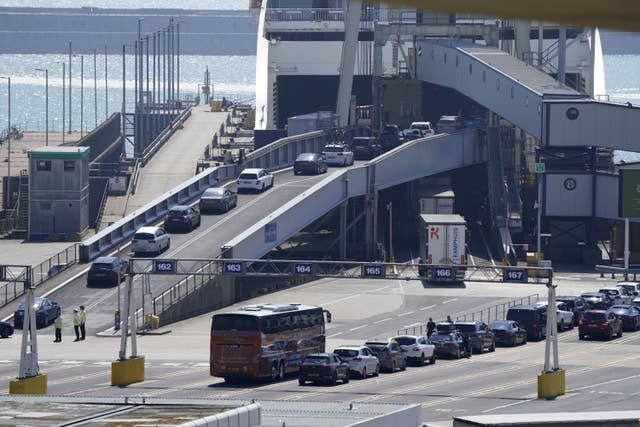Britain and France ‘put plans in place’ to prevent further border travel chaos
British and French border force officials said the two countries are ‘working closely’ to support the smooth flow of traffic.

Britain and France have announced they have put plans in place to prevent further border chaos.
In a joint statement on Friday, Phil Douglas, director general of Border Force and Brigitte Lafourcade, deputy director general at Police Aux Frontieres said the two countries are “working closely” to support the smooth flow of traffic.
It comes after tens of thousands of families saw their cross-Channel journeys ruined last weekend by gridlocked traffic and delays of several hours, blamed on a shortage of French border officers and a serious crash on the M20 coinciding with the school holidays.
Mr Douglas and Ms Lafourcade said: “France and the UK have been working closely together over recent days to prepare for the management of our shared border through the current period of increased passenger traffic.
“Both Police Aux Frontieres and UK Border Force, in partnership with the port operators, have put plans in place at the juxtaposed controls on both sides of the Channel this weekend to maximise passenger flows.

The Cabinet Office said earlier on Friday that UK and French officials have had regular discussions this week on the travel chaos.
They have now established a new “UK-French Passenger Technical Working group”, which will meet weekly during the summer in order to prevent further disruption for passengers travelling to either side of the Channel.
Traffic enforcement has also been put in place to keep roads passable around Dover and Folkestone, the Cabinet Office said.
Earlier on Friday, several major roads throughout the UK were hit by congestion, affecting holidaymakers heading to the south and south-west of England.
This was due to a combination of the first switchover days for holiday lets during the school summer holidays in England and Wales, a rail strike, the Commonwealth Games in Birmingham, and the start of the Football League season in England.
Most of the M25 was congested while the M5 heading south-west was seeing start-stop traffic.
Jams were also slow-moving on the westbound sections of the M4 towards Bristol, the M55/M6 interchange near Preston, Lancashire, the M42 east of Birmingham, the M60 and the M62 in Manchester and the A64 into York.
Yet fears of a repeat of last week’s horrendous delays on roads approaching the Port of Dover and Folkestone proved unfounded.
In Dover and Folkstone, the operation was much smoother on Friday, with P&O Ferries saying there were “no queues at border controls and traffic is free-flowing through the port”.
Port of Dover chief executive Doug Bannister said on Thursday that French border controls will be “fully resourced”, which will make a “fundamental difference”.
The port expects to welcome about 140,000 passengers, 45,000 cars and 18,000 freight vehicles between Thursday and Sunday.
National Highways, which manages England’s motorways and major A roads, said: “Drivers travelling in and around Kent are advised to plan ahead as this weekend is likely to be extremely busy.
“Operation Brock contraflow remains in place on the M20 and is part of a series of measures to improve Kent’s resilience and ensure the smooth flow of traffic through the region in the event of disruption to services across the English Channel.”
Jack Cousens, head of roads policy for the AA, said: “While this heavy traffic is a frustration for many, those working for the British tourism industry should be delighted that so many want to holiday at home and explore the best Britain has to offer.
“The one shining light has been the South East where both Dover and Folkestone have little to no delays.
“However, tomorrow will be even busier, so drivers planning to hit the road need to be prepared for stop-start traffic.





